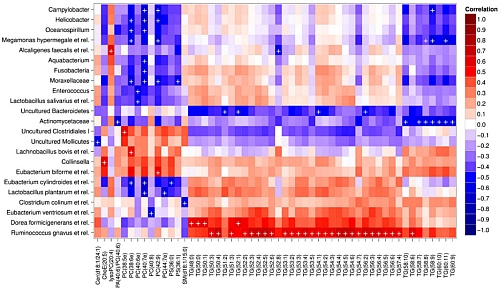Tell me what’s in your guts, I’ll tell you what’s in your blood!
Last year, PeerJ published “Associations between the human intestinal microbiota, Lactobacillus rhamnosus GG and serum lipids indicated by integrated analysis of high-throughput profiling data”.
This well-received study reveals associations between intestinal microbiota and key metabolic components in our body – blood serum lipids. This analysis, based on a unique combination of high-throughput profiling of 130 bacterial groups from fecal samples and hundreds of distinct blood serum lipids from a carefully controlled probiotic intervention study, is bridging the gap between the studies on human microbial ecology and host metabolism.
As you can see, this article has already been cited 5 times, it has been viewed almost 2,000 times, and the PDF has been downloaded over 1,600 times (a high ratio of PDF downloads to views indicates high engagement with an article). This shows that this study is already making a significant impact in the field.
We invited Dr Leo Lahti, corresponding author on this article, to comment on the impact of his work.
“The study was well received among our peers as it provides important new information about the interplay between our physiology and the diverse microbial communities in our intestinal tract, and of the possibility to manipulate this ecosystem by probiotic interventions. Although the composition and function of the intestinal ecosystem have been studied extensively, the host interactions and potential manipulation of the intestinal microbiota are less well understood. Hence the study has been well received both by biomedical researchers and microbial ecologists, showing the cross-disciplinary impact of the work”, Lahti explained. “We have also released the data and analysis tools along with the paper, which may be of additional interest for those who are working on similar topics, or need test data sets for further methods development.”
Since the publication of this work, Dr Lahti and his collaborators have continued to investigate the possibilities for manipulating the intestinal ecosystem and subsequently host physiology, based on dietary interventions. “Diet is a key determinant of the intestinal microbiota composition with direct implications for our physiology and health”, Lahti said. “In our recent ISME paper with Anne Salonen and others, we report the impact of diet and individual variation on intestinal microbiota composition and its fermentation products, and analyze the host insulin sensitivity based on blood samples. Although the microbiota composition and its responses to dietary changes are highly individual, specific dietary changes have clearly distinguishable effects on the intestinal microbiota.”
Individual variation is high, so it is important to understand the limits of this variability in normal populations, and how this balance might be shaken when health is compromised. In the Wageningen and Helsinki research groups they have now with Prof. Willem de Vos profiled the abundance of a thousand bacterial species across over 5,000 intestinal samples based on the Human Intestinal Tract (HIT)Chip phylogenetic microarray. This uniquely large data collection allows a deep and comprehensive characterization of the ecosystem state between age groups, geographical regions, in health and disease, or following antibiotic, probiotic and dietary interventions.
Join Dr Lahti and thousands of other satisfied authors, and submit your next article to PeerJ.


